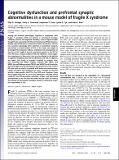| dc.contributor.author | Krueger, Dilja | |
| dc.contributor.author | Osterweil, Emily | |
| dc.contributor.author | Chen, Stephanie P. | |
| dc.contributor.author | Tye, Lynne D. | |
| dc.contributor.author | Bear, Mark | |
| dc.date.accessioned | 2011-09-21T15:16:36Z | |
| dc.date.available | 2011-09-21T15:16:36Z | |
| dc.date.issued | 2011-02 | |
| dc.date.submitted | 2010-09 | |
| dc.identifier.issn | 1091-6490 | |
| dc.identifier.uri | http://hdl.handle.net/1721.1/65898 | |
| dc.description.abstract | Among the hallmark phenotypes reported in individuals with fragile X syndrome (FXS) are deficits in attentional function, inhibitory control, and cognitive flexibility, a set of cognitive skills thought to be associated with the prefrontal cortex (PFC). However, despite substantial clinical research into these core deficits, the PFC has received surprisingly little attention in preclinical research, particularly in animal models of FXS. In this study, we sought to investigate the molecular, cellular, and behavioral consequences of the loss of the fragile X mental retardation protein in the PFC of Fmr1 KO mice, a mouse model of FXS. We identify a robust cognitive impairment in these mice that may be related to the deficits in cognitive flexibility observed in individuals with FXS. In addition, we report that levels of proteins involved in synaptic function, including the NMDA receptor subunits NR1, NR2A, and NR2B; the scaffolding proteins PSD-95 and SAPAP3; and the plasticity-related gene Arc, are decreased in the prefrontal cortex of Fmr1 KO mice and are partly correlated with behavioral performance. Finally, we report that expression of c-Fos, a marker of neuronal activity, is decreased in the PFC of Fmr1 KO mice. Together, these data suggest that Fmr1 KO mice may represent a valuable animal model for the PFC-associated molecular, cellular, and behavioral abnormalities in FXS and that this model may be useful for testing the efficacy of therapeutic strategies aimed at treating the cognitive impairments in FXS. | en_US |
| dc.description.sponsorship | FRAXA Research Foundation | en_US |
| dc.description.sponsorship | National Institute of Mental Health (U.S.) | en_US |
| dc.description.sponsorship | Eunice Kennedy Shriver National Institute of Child Health and Human Development (U.S.) | en_US |
| dc.description.sponsorship | Simons Foundation | en_US |
| dc.description.sponsorship | Massachusetts Institute of Technology (Cathy M. Comeau (1987) Memorial Fund) | en_US |
| dc.language.iso | en_US | |
| dc.publisher | National Academy of Sciences (U.S.) | en_US |
| dc.relation.isversionof | http://dx.doi.org/10.1073/pnas.1013855108 | en_US |
| dc.rights | Article is made available in accordance with the publisher's policy and may be subject to US copyright law. Please refer to the publisher's site for terms of use. | en_US |
| dc.source | PNAS | en_US |
| dc.title | Cognitive dysfunction and prefrontal synaptic abnormalities in a mouse model of fragile X syndrome | en_US |
| dc.type | Article | en_US |
| dc.identifier.citation | Krueger, D. D. et al. “Cognitive dysfunction and prefrontal synaptic abnormalities in a mouse model of fragile X syndrome.” Proceedings of the National Academy of Sciences 108 (2011): 2587-2592. ©2011 by the National Academy of Sciences. | en_US |
| dc.contributor.department | Massachusetts Institute of Technology. Department of Brain and Cognitive Sciences | en_US |
| dc.contributor.department | Picower Institute for Learning and Memory | en_US |
| dc.contributor.approver | Bear, Mark | |
| dc.contributor.mitauthor | Bear, Mark | |
| dc.contributor.mitauthor | Krueger, Dilja | |
| dc.contributor.mitauthor | Osterweil, Emily | |
| dc.contributor.mitauthor | Chen, Stephanie P. | |
| dc.contributor.mitauthor | Tye, Lynne D. | |
| dc.relation.journal | Proceedings of the National Academy of Sciences of the United States of America | en_US |
| dc.eprint.version | Final published version | en_US |
| dc.type.uri | http://purl.org/eprint/type/JournalArticle | en_US |
| eprint.status | http://purl.org/eprint/status/PeerReviewed | en_US |
| dspace.orderedauthors | Krueger, D. D.; Osterweil, E. K.; Chen, S. P.; Tye, L. D.; Bear, M. F. | en |
| dc.identifier.orcid | https://orcid.org/0000-0003-0582-2284 | |
| dspace.mitauthor.error | true | |
| mit.license | PUBLISHER_POLICY | en_US |
| mit.metadata.status | Complete | |
